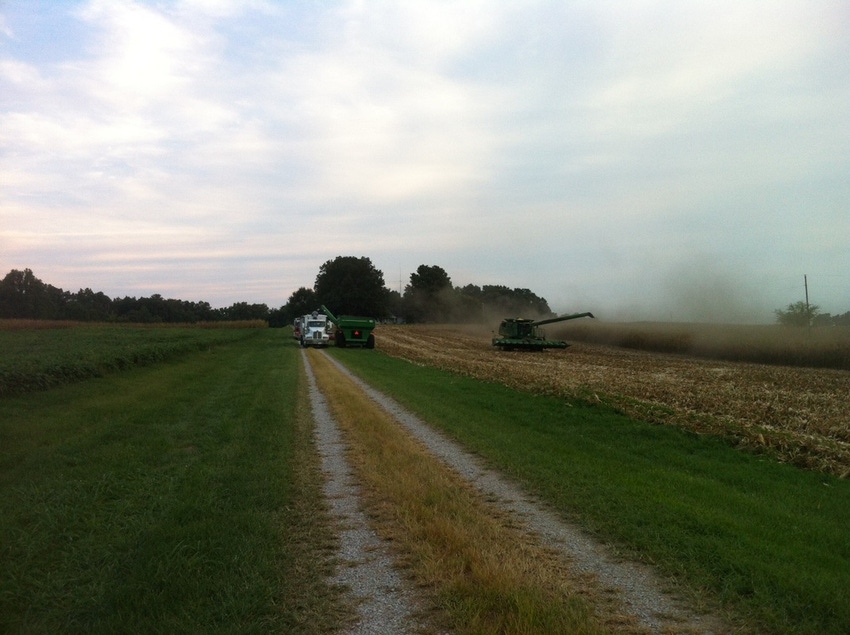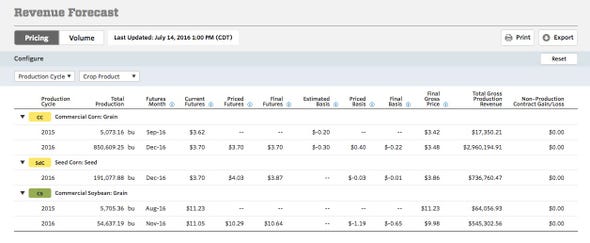August 4, 2016

Stephanie Halcomb
Operations Manager, Walnut Grove Farms
Adairville, Kentucky
Tell us a bit about yourself and your farm.
I work at my husband’s family farm since 2012. It’s a sixth generation farm in Kentucky. My background is in manufacturing, so when I came onboard I wanted to put processes in place. One of first was a spreadsheet to keep track of our sales so that I could understand our average prices over the year. While I’m more focused on the financial side, I am also responsible for managing the operational backend - layout our plans at the beginning of the year, manage our software, capture our activities, etc. Then my husband, a production manager and an ops supervisor, manage our team.
How would you characterize your grain marketing strategy?
Most of those decisions are made by my father-in-law. In general, we do quite a bit of forward contracting, but only do it when the price is right. This means that it is at least break-even. Unfortunately current prices have been below that for most farms. But it is key for us to know our break-even for each of our fields to know if we should sell.

Do you have a target percent of expected yield that you try to sell at certain points in the production cycle?
The markets obviously dictate a lot of what we do, but generally we’re no more than 50 percent of our APH sold at planting. By harvest, we’ll be anywhere from 80 - 100 percent sold.
How does on-farm grain storage affect your marketing strategy?
We have detailed plans for crop storage, even when the crop is forward sold. We’ve added more storage capacity recently, but we can’t store everything we produce so we need to be strategic. We can plan to store it after harvest, and some of our customers will pay for that. For example with our wheat, we’ll harvest it in June, and hold a certain percent of our bushels for the following year. Having storage gives us a lot of flexibility, and we still have very detailed plans. We don’t want to run out, obviously.
What do you do for risk management? Are you utilizing futures and options in addition to crop insurance?
We don’t have a silver bullet tool. We try to read newsletters and markets and stay abreast of trends. We work with a marketing and brokerage firm to handle our options contracts. I would say we probably use their advice of when to buy options most of the time. We also depend a lot on my father-in-law and his experience. But I am also a numbers person and I like to stay really close to what we’re doing and our projected sales.
How does Granular play into your risk management strategies?
We use Granular to manage all of our contracts. The Revenue Forecast tool lets us track our futures prices and contracted quantities, so we have everything rolled up to know what our projected sales are. I can pull up this report and if the market is above my average price (and I still have enough to sell), that’s a trigger to make a decision.
Also, having real-time harvest data from Granular is critical. I love being able to have it as soon as a field is harvested- this means I don’t have to download grain cart data or wait around - that is key during harvest. Are you making above your APH or below? How do we need to change our storage? Should we sell more?
What marketing lessons could you share with up and coming farmers?
My dad always forward sold a lot. In the bull market of 2007-2014, this didn’t look so smart. The market kept going for four, five, six years in a row. Why would you want to forward sell? But when the party was over, it made you realize that forward selling was not that bad after all. Now we forward sell just to get to the risk level we’re comfortable, but always looking a bit further out. The key though is getting a very good feel for your break-even. We feel much better about managing our risk now that we know what that is, for each of our farms, and the business as a whole.
About the Author(s)
You May Also Like






